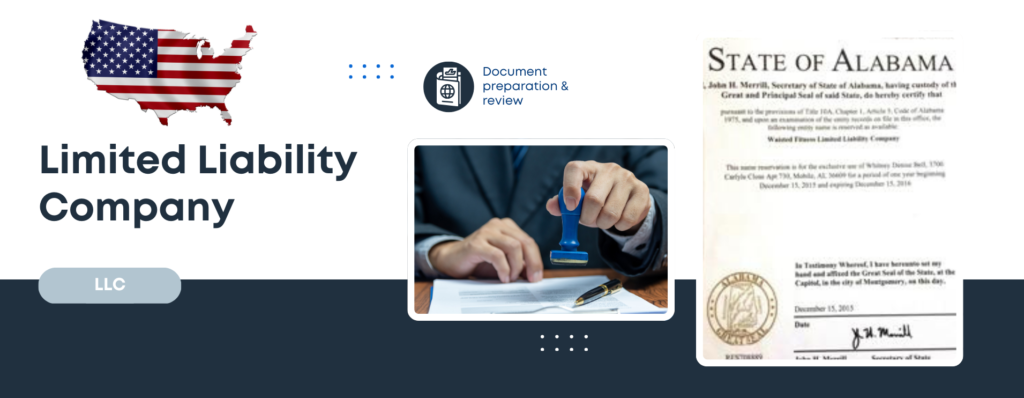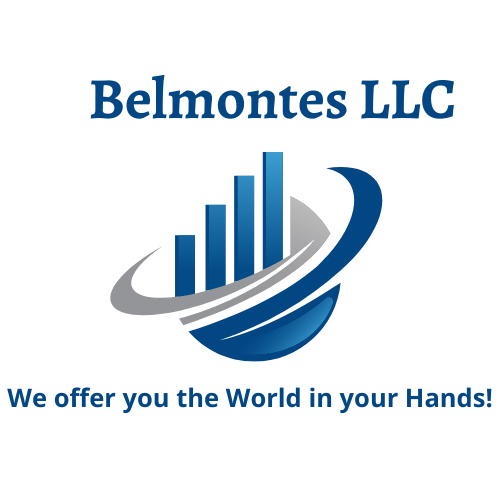
Limited Liability Company LLC
A Limited Liability Company (LLC) is a flexible business structure that combines the liability protection of a corporation with the tax benefits and simplicity of a partnership or sole proprietorship. It is a popular choice for small to medium-sized businesses due to its versatility and ease of operation.

Key Characteristics of an LLC:
- Limited Liability:
- Owners (called members) are not personally liable for the debts and obligations of the LLC. Their liability is limited to their investment in the company.
- Taxation:
- By default, an LLC is treated as a pass-through entity for tax purposes, meaning profits and losses are passed through to the members, who report them on their personal tax returns.
- Alternatively, an LLC can choose to be taxed as a corporation (C-Corp or S-Corp) if it is more beneficial.
- Ownership:
- An LLC can have one owner (single-member LLC) or multiple owners (multi-member LLC).
- Owners can be individuals, corporations, other LLCs, or foreign entities.
- Management:
- An LLC can be managed by its members (member-managed) or by appointed managers (manager-managed).
- Flexibility:
- LLCs offer significant flexibility in terms of ownership structure, profit-sharing, and management.
Advantages of an LLC:
- Limited Liability:
- Members are protected from personal liability for business debts and lawsuits.
- Pass-Through Taxation:
- Avoids double taxation (unless the LLC elects to be taxed as a corporation).
- Profits and losses are reported on members’ personal tax returns.
- Flexibility in Management:
- Can be member-managed or manager-managed, depending on the preferences of the owners
- Credibility:
- An LLC is often perceived as more professional and credible than a sole proprietorship or partnership.
Disadvantages of an LLC:
- Self-Employment Taxes:
- Members are subject to self-employment taxes on their share of the profits.
- Limited Life:
- In some states, an LLC may dissolve if a member leaves or passes away (unless specified otherwise in the Operating Agreement).
- State-Specific Rules:
- LLC regulations vary by state, which can complicate operations if the LLC operates in multiple states.
- Higher Costs:
- Formation and maintenance costs are higher than for sole proprietorships or partnerships (e.g., filing fees, annual reports).
- Limited Ability to Raise Capital:
- Unlike corporations, LLCs cannot issue stock, which may limit their ability to attract investors.
Taxation Options for an LLC:
- Default Taxation (Pass-Through):
- Single-member LLCs are taxed as sole proprietorships.
- Multi-member LLCs are taxed as partnerships.
- Electing Corporate Taxation:
- An LLC can choose to be taxed as a C-Corporation or S-Corporation by filing the appropriate forms with the IRS.
- This may be beneficial if the LLC wants to retain earnings in the business or take advantage of lower corporate tax rates.
LLC vs. Other Business Structures:
| Feature | LLC | Sole Proprietorship | Partnership | Corporation (C-Corp/S-Corp) |
|---|---|---|---|---|
| Liability | Limited liability | Unlimited liability | Varies (unlimited/limited) | Limited liability |
| Taxation | Pass-through (default) | Pass-through | Pass-through | Double taxation (C-Corp) or pass-through (S-Corp) |
| Ownership | Flexible (single/multi-member) | Single owner | Two or more owners | Shareholders |
| Management | Member- or manager-managed | Owner-managed | Partner-managed | Board of directors |
| Formation Complexity | Moderate | Simple | Simple | Complex |
When to Choose an LLC:
If you want liability protection without the complexity of a corporation.
If you prefer pass-through taxation but want more flexibility than a sole proprietorship or partnership.
If you want a flexible management structure and profit-sharing arrangement.
If you are starting a small to medium-sized business and want credibility with limited formalities.
Steps to Form an LLC:
- Choose a Business Name: Ensure the name is unique and complies with state requirements.
- Create an Operating Agreement: Outline the ownership structure, management, and operating procedures (not always required but highly recommended) You will receive it with your order
- Obtain Licenses and Permits: Ensure compliance with local, state, and federal regulations.
- Get an EIN: Apply for an Employer Identification Number (EIN)
An LLC is an excellent choice for entrepreneurs who want the benefits of limited liability and tax flexibility without the complexity of a corporation. It is particularly well-suited for small businesses, startups, and professional services firms.
The Fastest, Easiest and Cheapest Way to Obtain your Licenses.... As easy as 1, 2 and 3!
Ready to Get Started?
Don’t wait any longer! Take the first step towards making your business dreams a reality. Our team is here to provide you with personalized, efficient, and reliable services. Whether you need help with licenses, permits, tax numbers, or business registrations, we’ve got you covered.
You’ve made the exciting decision to start a business! Now, determining the legal structure is crucial because it impacts taxation, liability, and decision-making authority. To help you understand which licenses your business might need, you can take this small quiz:

Work with Us
Why Choose Us
Faster Solutions
Orientation to Our Clients
99.99% Success Rate in Our Procedures
Designing your Brand
How We Help You!
"The Success of your Business is the Success for our Business"
Business Filing US
We handle and complete your licenses in a very personal way. Upon submitting your documents, you will receive them by regular mail or e-mail. Please note that some documents must be presented in person or require the original signature of the owner or representative.

Verification of Information Received from the Client
“To ensure accurate and timely processing of your licenses, permits, registrations, or tax numbers, we verify that all necessary information has been received. In all states, it is mandatory to provide personal information for at least one of the business owners…”

Presentation of Licenses, Permits, Tax Numbers, and Registrations
“Using your provided personal and business information, we meticulously prepare all the necessary documents for your requested licenses and tax numbers. We conduct thorough verification of all information to ensure swift and successful approval.”

Delivery of Registration Certificates
“Most licenses and tax numbers will be delivered to you via email. We will strive to obtain original certificates for each license where possible. You may receive some original certificates by mail. For specific licenses, such as business licenses, please carefully review the service description, as some states require the original signature of the client.”
Find out which licenses are right for you in your state.
Some Questions on our blog

What licenses do you need to start a Handyman business?
Starting a handyman business requires obtaining several licenses and permits, which can vary depending on your location and the specific services you plan to offer. that depends a lot on what kind of structure your business has. Most new businesses start with a basic structure, i.e., Sole Proprietorship or Partnership. Whatever your situation, you will need to register a business name, obtain an EIN, and secure a business license. If you have employees, you will also need an Employer Number (State Tax ID number or Withholding Number).

What licenses do I need to start my business?
To start your business, you’ll need to obtain several licenses and permits, which can vary depending on your location and the type of business you’re starting. The answer depends a lot on what kind of structure your business has. Most new businesses start with a basic structure, i.e., Sole Proprietorship or Partnership. Whatever your situation, you will need to register a business name, obtain an EIN, and secure a business license. If you have employees, you will also need an Employer Number (State Tax ID number or Withholding Number).

I want to sell clothes from home, what licenses do I need?
To sell clothes from home, you'll need to obtain several licenses and permits to ensure you're operating legally. The answer depends a lot on what kind of structure your business has. Most new businesses start with a basic structure, i.e., Sole Proprietorship or Partnership. Whatever your situation, you will need to register a business name, obtain an EIN, and secure a business license. If you have employees, you will also need an Employer Number (State Tax ID number or Withholding Number).

I'm starting a business in FL, I want to register my LLC in the state?
Great choice! Registering your LLC in Florida is a straightforward process. Most new businesses start with a basic structure, i.e., Sole Proprietorship or Partnership. Whatever your situation, you will need to register a business name, obtain an EIN, and secure a business license. If you have employees, you will also need an Employer Number (State Tax ID number or Withholding Number).
Here are a few example questions on our blog:
- What Are the Key Steps to Start a Business in [Your State]?
- How to Choose the Right Business Structure for Your Needs?
- What Licenses and Permits Do You Need for a Home-Based Business?
- Understanding the Importance of an EIN and How to Get One
- Common Mistakes to Avoid When Registering Your LLC
- What Is a Registered Agent and Why Do You Need One?
- What Is a Registered Agent and Why Do You Need One?
- The Benefits of Incorporating Your Business
- Steps to Transition from a Sole Proprietorship to an LLC




Business Filing US
We are not affiliated with the government. Please be aware that we are a firm that assists you in fulfilling all the necessary requirements to start your business, for a fee for our services.
By submitting your electronic signature, you authorize BusinessFilingUS.com or licenciasdenegociosusa.com to complete and sign all your licenses on your behalf, unless an original signature is required.
Additionally, it will be necessary for you to provide all the information we need for this process, including your SSN, DOB, and driver’s license, depending on the state where your business is located.



















































